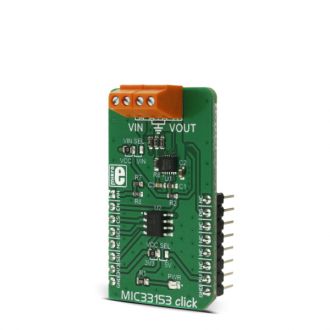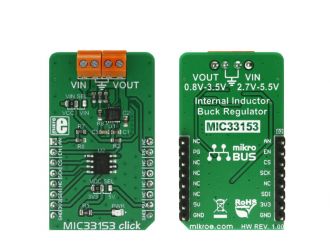
We strongly encourage users to use Package manager for sharing their code on Libstock website, because it boosts your efficiency and leaves the end user with no room for error. [more info]

Rating:
Author: MIKROE
Last Updated: 2018-01-18
Package Version: 1.0.0.0
mikroSDK Library: 1.0.0.0
Category: Buck
Downloaded: 6099 times
Not followed.
License: MIT license
MIC33153 click is a DC-DC adjustable step-down (buck) converter that is designed to deliver a substantial amount of current to very demanding loads, with the voltage output up to 3.5V.
Do you want to subscribe in order to receive notifications regarding "MIC33153 click" changes.
Do you want to unsubscribe in order to stop receiving notifications regarding "MIC33153 click" changes.
Do you want to report abuse regarding "MIC33153 click".


Library Description
Initializes and defines SPI driver, defines driver's function that writes a 12-bit value in DAC, and that causes the output voltage to be set at the determined value. This function checks PG (INT) pin state that shows the result of comparing the output voltage with its steady-state voltage. It also enables or disables the output voltage. Check the documentation for more details.
Key functions
void mic33153_writeDAC(const uint16_t valueDAC)- Function writes 12-bit value to DAC
void mic33153_enableOut(uint8_t state)- Function enables or disables output voltage
uint8_t mic33153_checkPowerGood(void)- Function checks state of PG (INT) pin
Examples Description
The demo application is composed of three sections:
void applicationTask()
{
uint8_t powerGood;
mic33153_enableOut(_MIC33153_OUT_ENABLE);
mic33153_writeDAC(_MIC33153_VOLTAGE_2000MV);
powerGood = mic33153_checkPowerGood();
if(powerGood && i)
{
mikrobus_logWrite("Output voltage is above 92% of its steady state voltage.", _LOG_LINE);
i = 0;
}else if((powerGood == 0) && (i == 0))
{
mikrobus_logWrite("Output voltage is below 86% of its steady state voltage.", _LOG_LINE);
i = 1;
}
Delay_ms(2000);
}
Additional notes and information
Depending on the development board you are using, you may need USB UART click, USB UART 2 click or RS232 click to connect to your PC, for development systems with no UART to USB interface available on the board. The terminal available in all MikroElektronika compilers, or any other terminal application of your choice, can be used to read the message.